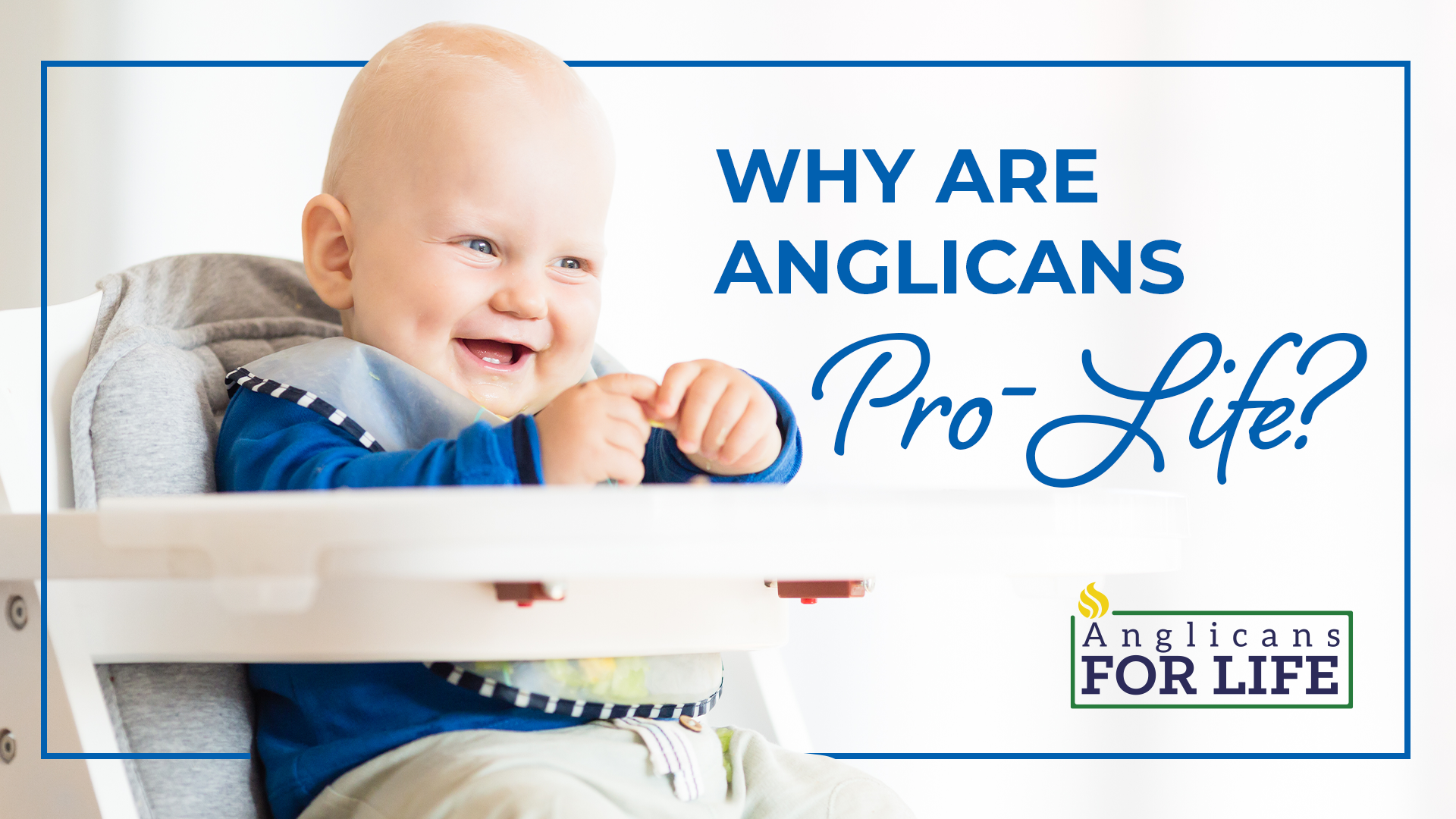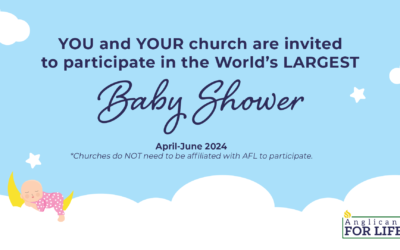The Scriptures Teach Us to be Pro-Life
By the Rev. Deacon Georgette Forney and Anglican Compass
People often say that abortion isn’t mentioned in the Bible. But the command to protect and honor Life is implicit in every word of Scripture.
First, we need to understand that the value of human life is based in our creation by God and in our redemption through Jesus. “Do you not know that your body is a temple of the Holy Spirit, who is in you, whom you have received from God? You are not your own, you were bought at a price. Therefore, honor God with your body.” (1 Corinthians 6:19-20). Our lives have value not because they are ours but because they are His! For this reason, we must live our lives giving glory to God and living in His statues. In this way, Scripture firmly contradicts the “my body, my choice” mantra of abortion supporters.
Second, because our lives have value in Him, we as His people are called to protect and honor all Life. The clearest evidence of this is in the commandment, “You shall not murder.” (Exodus 20:13) But even earlier, in the book of Genesis, God declares that the spilling of man’s blood is inherently wrong, due to our status as God’s beloved creation: “Whoever sheds the blood of man, by man shall his blood be shed; for in the image of God has God made man.” (Genesis 9:6)
True, society in general believes that murder is wrong. However, Scriptures show that “valuing” Life goes beyond avoiding the act of killing. Honoring the sacredness of Life means serving those in need and sharing the love of God. Christ demonstrates how we should do this: “For I was hungry, and you gave me nothing to eat, I was thirsty, and you gave me nothing to drink, I was a stranger and you did not invite me in…Truly I tell you, whatever you did not do for one of the least of these, you did not do for Me.” (Matthew 25:41-45) Being a life-affirming Christian means more than opposing death—it means serving those who are hurting, lonely, and broken. It means caring for the “least of these,”—the unborn, the homeless, the single mothers, the elderly, and the handicapped. Because our lives are valuable to God, so theirs must be to us.
God didn’t “forget” to talk about abortion, assisted suicide, or euthanasia in the Scriptures. The gift of Life is proclaimed in all of God’s commands and in everything that God has created, including us.
Science Reveals that Life Begins at Conception
Science has become a god in our modern age. How swiftly our heads are turned by the latest scientific breakthrough. How quick are we to seek assurance in doctors and scientists and to see their answer as final and absolute. But science is anything but static and unchanging. It is constantly changing, evolving, and learning. There is no greater example of this than in the science of fetal development.
The first ultrasound was performed in Glasgow, Scotland in 1956, but they weren’t regularly used until the late 1970s—notably after the Roe v. Wade decision in 1973. These once fuzzy gray and white pictures have become clearer and clearer, revealing a truth that we as Christians have always known—a child in the womb is more than just a clump of cells. Through ultrasound we now know that during first month of pregnancy a child’s heart starts beating. We know that at two months a child begins developing fingerprints, grows ears, lips, and a tongue, and can even suck his or her thumb. At three months a child has fingernails and toenails and can even begin to grab! Science has opened the dark doors of the womb and shown the wonders therein.
Science is also developing in its understanding of what children in the womb can feel—specifically, whether or not they feel pain. In 2013, a study showed that unborn babies as early as 8 weeks gestation reflexively reacts to invasive procedures. A different study in 2013 used functional magnetic resonance imaging (fMRI) to study the brains of unborn babies at 24-39 weeks of gestation and found that, at 22 weeks, unborn babies already had sufficiently functional neuronal connections to experience pain. In fact, instead of not feeling pain, unborn babies may actually feel pain more intensely than a born adult. Because neural mechanisms that inhibit pain sensations do not develop until 34-36 weeks gestation, unborn and pre-term babies show a hyperresponsivness to pain. A 2015 study found that babies had 18 out of 20 of the same brain regions as adults and were four times more sensitive to pain than adults. (If you want to learn more about fetal pain research, the Charlotte Lozier Institute has an excellent fact sheet).
Christians should not shy away from using science to make the case for Life. Indeed, understanding the science of human development can only help show the truth—that the unborn are uniquely and wonderfully created and deserve protection and care.
Church History Reveals a Consistent Pro-Life Ethic
There is a perception today among some that modern Christians are pro-life merelyfor contemporary partisan political reasons. Of course, some of our particular political stances and solutions may or may not be driven by such partisanship. However, from earliest times, and universally, the Christian church has opposed abortion, infanticide and euthanasia.
One of the earliest Christian documents, the first century Didache forbids abortion. The first/early second century Letters of Diognetus and Barnabas both state that Christians do not commit abortion or expose their young (exposure was the common practice of leaving an infant exposed to die alone in the wilderness). Justin Martyr (C. 155 AD) writes that abortion was prohibited. Athenagoras wrote in 180 AD that a fetus is “a created being, and therefore an object of God’s care.”
In the early third century, Tertullian wrestled with the question of when life begins, writing, “Nor does it matter whether you take a way a life that is born or destroy one that is preparing to be born. It is a human if it is going to be a human. You already have the fruit in its seed.”
These are examples of Christian voices speaking on life issues, and there simply aren’t any voices advocating for abortion or infanticide. In fact, social historical Rodney Stark has pointed out, “Perhaps above all else, Christianity brought a new conception of humanity to a world saturated with capricious cruelty and the vicarious love of death…Christians effectively promulgated a moral vision utterly incompatible with the casual cruelty of pagan custom…[W]hat Christianity gave to its converts was nothing less than their humanity.” (Stark, the Rise of Christianity).
In fact, the Christian effort to protect and honor all life was so successful that for thousands of years, the legal norm was to protect unborn life. Even though in practice this legal norm was sometimes ignored, it was the standard ideal.
Christians today may sometimes mix our personal politics up in our advocacy, that is true. However, the pro-life position has been a central part of Christian advocacy from the beginning.
Pastoral Experience Points us to Life
Anglicans for Life has pointed out, “Although women often feel relief immediately after the abortion, many women experience depression, suicidal thoughts, increased drug/alcohol use, anxiety, and guilt in the months and years after the abortion. A woman who undergoes an abortion has a suicide risk six times higher than women who have given birth to a child. Additionally, according to a 2011 study from Britain’s Royal College of Psychiatrists, women who have abortions are 81 percent more likely to experience subsequent mental health problems.”
Anglican deacons and priests can attest that many men and women suffer post-abortion. Although we can’t always share personal stories due to confidentiality, most of us have walked through experiences of anxiety, guilt and depression that men and women experience.
As pastors, we know the fallout of legalized abortion. As pastors, we also see the need for increased support for mothers and fathers, both from the church and from society as a whole. We see the need for grace and forgiveness, for love and understanding too. We see the need for more centers for women to seek information and support.
Personal Experience: Georgette
“You’re pregnant!” These two words can illicit joy or fear, depending on circumstances in the mother’s and father’s lives. Joy says welcome to the new life, while fear sees the newly formed human as a threat to one or both parents.
As a 16-year-old, when I heard those words, they created fear in me. Fear that people would find out I was sexually active and think less of me. Honestly, I was more afraid of losing my reputation as a ‘good’ girl than I was of going through with the abortion. I had no idea what the abortion entailed but I was told it would make my ‘problem’ go away and for me the baby growing in my womb was a problem and a threat to my future.
I was a Christian for 11 years, before I found the courage to bring my sin of abortion to God and seek forgiveness, I firmly believed it was the one sin He wouldn’t forgive.
Now 43 years later, I look at that frightened 16-year-old with compassion and the assurance of God’s forgiveness and mercy. I’ve also learned we need to do better in helping women so that regardless of where they are in life, when the words “You’re pregnant” are spoken to them, any fears they feel can be assuaged with the assurance that their baby is a gift from God, followed immediately with the promise that we will be there to help them survive and thrive with the blessing of the baby.
How can Churches Serve?
A recent survey by LifeWay and CareNet found that of the 1,038 surveyed women who had abortions, 70% claimed Christian religious affiliation, and 43% reported attending church monthly or more at the time of an abortion. The survey also revealed that women dealing with unplanned pregnancies saw the Church as “lacking grace” and “gossiping rather than helping”. Among women who had an abortion:
- 65% said church members judge single women who are pregnant.
- 54% think churches oversimplify decisions about pregnancy options.
- 41% believe churches are prepared to help with unwanted pregnancies.
The head of the survey for LifeWay Research said, “Women are perceiving judgment from the church, and that’s probably partly because there are clear teachings in the Bible including about how and why we make judgments. However, if they don’t start experiencing something different than what they’ve seen in the past, these numbers aren’t going to change.”
Churches aren’t intentionally creating an environment that encourages judgement or seeks to be unkind to women facing unplanned pregnancies, even if they are unmarried. However, as people who are called to support life, we must ensure that our churches are well-equipped to provide both practical and spiritual assistance to any woman facing an unplanned pregnancy, so she sees the baby as an unplanned blessing and not as a reason for condemnation.
We also want to be offering those who for whatever reason chose abortion in the past, to know that God’s forgiveness and healing is available to them. Abortion recovery programs provides a safe emotional and spiritual place so those hurting after abortion can honestly share their pain and find reconciliation and healing with God, and their aborted child/children.
Originally published on Anglican Compass here.




